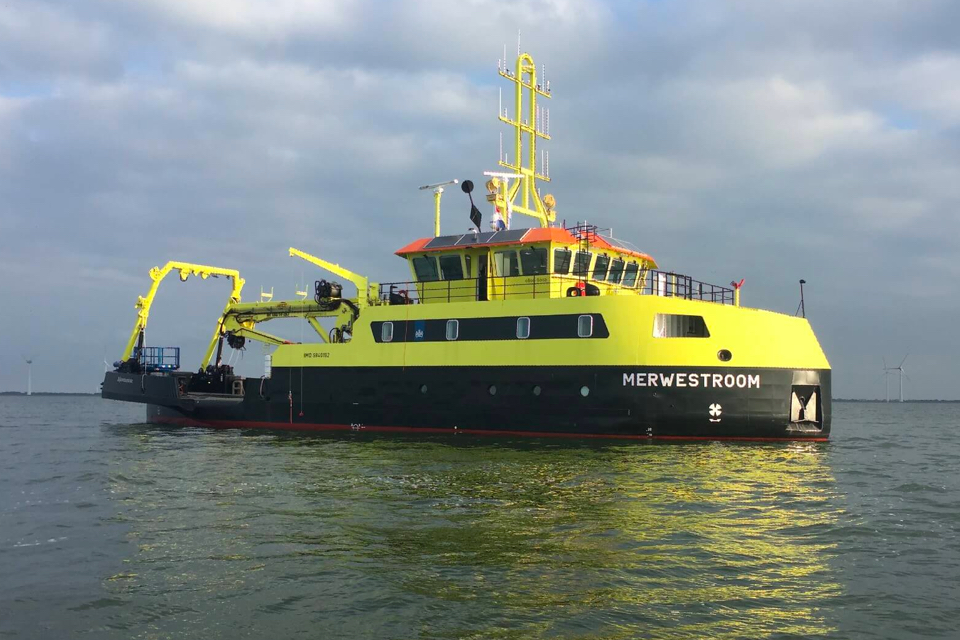The Dutch Government’s organisation for public works Rijkswaterstaat has taken delivery of its first MPV-30, the Merwestroom, but with a deeper draught than intended. The project was characterised by delays once it became apparent the ships did not comply with original requirements. Their deeper draught has been accepted for now, but the ships may still be lengthened in the future.
In total, three so-called Multi-Purpose Vessels (MPVs) 30 were ordered to replace five of Rijkswaterstaat’s existing ones. As the name indicates, the ships can be used for a variety of tasks, such as fairway marking, patrols, measurements and research.
Too deep, blocked lines of sight and propulsion issues
Once the third ship in the series was launched in November 2018, it became clear the ships were too deep in the water, which meant they would not be able to sail everywhere they were needed. In addition, a crane on the ship partially blocked the lines of sight from the bridge, thereby hampering safe operation of the ship.
According to Minister Van Nieuwenhuizen of Infrastructure and Water Management, the defects were caused by alterations to the original design. In a letter to Parliament on 29th of May 2019 she reported ‘these changes had greater consequences than expected.’
In the same letter, the Minister also informed Parliament of another problem that had arisen with the ship, namely its propulsion system. She stated there were problems ‘with the electric motors for the V-pods’ amongst others causing yet more delays. Delivery was then expected for the first quarter of 2020, which has now become 15 May. The ships are being built at Bijlsma Wartena shipyard.
Ships may be lengthened in future
Although the problems with the lines of sight and the propulsion system have been solved, the ship’s depth has not. As an interim solution, it has been decided to have the ships certified again for the changed maximum draught, allowing them to sail with the deeper draught.
The Minister wrote to Parliament on 24 July 2019, that: ‘The expectation is that with this new certification the ship will be usable for approximately eighty per cent of the sailing area. In shallow waters (parts of the Wadden Sea and the waters of the Dutch provinces of Zeeland and Zuid Holland), the vessels will not be able to carry out the intended tasks. For these areas, some of the current vessels will have to remain in use for a longer period of time.’
This also means the Merwestroom may not be able to perform all tasks it was intended for, as it was to be used for work on the floating waterway markings in the waters of Zeeland, the Wadden Sea and the IJsselmeer.
Van Nieuwenhuizen adds that a structural solution to ensure that the ship is less deep, is to lengthen the ship. ‘If practice shows the employability of the vessels, I will decide whether it is necessary and efficient to extend the three MPV-30 type vessels, or whether it is sufficient to extend one or two vessels to carry out all of the intended tasks.’ She confirmed again that lengthening may still be in the cards for the ships at a later time following delivery in letter sent to Parliament on 8 May. For now, the ships will sail with the deeper draught.
The ships were ordered for a total of 26.3 million euros. The design changes requested by Rijkswaterstaat cost an additional 1.4 million euros. It is not yet clear what the total price tag will come down to taking into account the costs made to rectify the propulsion system and the line of sight. A possible lengthening of the ships is also not included in the amount mentioned. It is also being investigated who exactly is liable for the extra costs incurred.
Battery propulsion
The MPV-30 is equipped with batteries that are large enough to carry out the daily work using just the battery pack. Because the engines are used less, the energy consumption is low. The ship also has solar panels for, for example, the power supply in the accommodation of the crew. Because the ships are not operational at night and are usually moored in a port, the batteries can be charged with shore power.
The other two MPV-30 ships will be delivered later this year.








